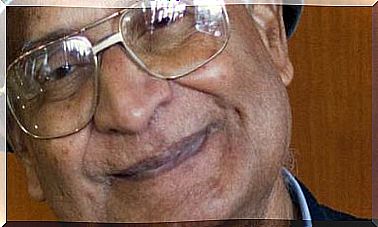Why Do We Fool Ourselves? For Sheer Survival
The brain uses this mechanism as protection to filter out aspects of reality that would be unbearable or to improve our self-esteem. But it has its dangers …

Self-deception is a resource to which we sometimes turn to face difficult situations. Sometimes we do it consciously, but other times it is the brain that slightly alters our perception of reality.
This mechanism has its virtues and its dangers: we must not forget that being realistic helps us achieve our goals, identify difficulties and face them with the maximum clarity and energy possible.
It is necessary to avoid that the unconscious self-deception becomes conscious if we do not want to fall into some of the worst behavioral pathologies, both individually and collectively.
When does the brain use self-deception?
Scientists have found that there are at least four situations in which we are likely to unconsciously resort to self-deception:
1. The survival instinct
It is very common in the face of great dangers or major catastrophes, such as a serious illness, a tsunami or an act of criminal violence.
The brain filters out the unbearable aspects of reality and only pays attention to those it can digest
According to a good number of evolutionary psychologists, it is a universal mechanism of adaptation to the environment that has the utility of improving vital expectations because it avoids us falling into panic.
“Eyes that do not see, heart that does not feel”, the saying goes. Ignoring the true magnitude of the threat makes us stronger and more aggressive against it, and therefore more effective.
2. Transfer guilt
The second type of self-deception has to do with self-esteem.
It consists of eliminating (or at least reducing) the guilt for the bad actions carried out in the past. As we can no longer change the facts, it is more adaptive not to fall into self-punishment and the easiest way to achieve this is to transfer the guilt of our bad actions to third parties, to special circumstances or even to the victim herself.
This form of self-deception also entails a serious danger, for us:
If we do not recognize our responsibility we can never correct our mistakes
And also for others: let’s look at the use and abuse that abusers, torturers and some murderers make of this self-deception.
The greatest problems of humanity do not come from “cruel and evil” beings, but from those who consider themselves good people, present themselves as such before us and justify their misconduct to keep that conviction intact.
3. The overvaluation of one’s qualities
If a certain characteristic of our personality (lack of memory, for example) does not harm our self-esteem excessively, we can recognize it without problems. But if one of our characteristics (intelligence, for example) can be linked to a loss of self-esteem, we automatically overvalue ourselves and come to consider ourselves favored.
This type of self-deception has the virtue of improving our self-esteem and motivation to face life. But it also has a danger: we can fall into narcissism, petulance and arrogance.
Applied to the group scale 1, this type of self-deception can lead to a people considering themselves chosen by God; some believers, in possession of the only truth; a nation, with more rights than its neighbors, or a race, superior to all and with the right to eliminate the races it considers inferior.
4. Overvaluing the capacity for change and self-improvement
Typical examples that we find in our environment: “Smoking hurts me, but I’ll quit the day I start doing it” or “I have a few kilos left over, but one of these days I’ll start the diet and fix it quickly.”
Self-motivation is convincing yourself that you can change and achieve your goals without lying to yourself about your possibilities or the difficulties to overcome
A couple of examples to differentiate self-motivation from self-deception: if I am obese, clumsy, and dance poorly, self-deception consists in thinking that I am an excellent dancer. Instead, self-motivation would make me see that my obesity can disappear with a proper diet, my clumsiness can be overcome with intensive body work, and I can take as many dance classes as I need.
Self-motivation and dreams
Good teachers, coaches, managers, political leaders, are those who know how to motivate the people in their charge, firmly and charismatic authority preventing them from falling into self-deception and guiding them on the path to overcome difficulties.
When the FC Barcelona coach Pep Guardiola (followed in the main business administration schools as a model of motivational leadership) welcomes the excellent youth squad player Leo Messi and makes him believe that he can become the best footballer on the planet, he establishes a sheet of route that will lead to make this wish come true.
Having a dream can be the first milestone in a personal or collective history of overcoming
It may be true, as some philosophers have said, that life is nothing more than a dream, but what is clear is that good dreams feed the most interesting lives. However, for these dreams to come to fruition, it is advisable not to fall into conscious self-delusions, but to know the difficulties to overcome and face them with all the strength and optimism of which we are capable.
How to avoid self-deception
There are signs that warn us that we are deceiving ourselves. If we learn to detect them, we can deactivate them.
Listen to others
Share risky decisions with affected people. Thinking that you always know what is good for others without having to consult them is a typical arrogance of self-deception. Propose your plan and listen to the alternative plans that those affected propose. It is likely that one of them will surprise you with a better proposal than yours.
Intelligence is a gift that is unevenly distributed, but you are not the only one who possesses it.
Evaluate your actions
Ask for honest opinions from people to whom you give judgment and honesty. If you are always fully satisfied with your actions and decisions, it is most likely that you are falling into the self-deception of overvaluing yourself. Ask people you admire to unreservedly value your performances, and prepare to be disappointed: you’re not 100% perfect in everything you do. Nobody is.
Be open to criticism
Analyze with humility if they are partially right. Listen to the criticisms received, wherever they come from, and seriously analyze what they can be true. Do not make the mistake of not doing them. Before taking away their reason, try to put yourself in the position of others and understand well what they are saying to you.
Fix your mistakes
Apologize immediately, if you have been able to come to recognize that in a certain action you were wrong, and try to repair it without delay. Do not fall into the self-deception of thinking that mistakes are irreparable and that it is better to forget them, that time erases everything.









